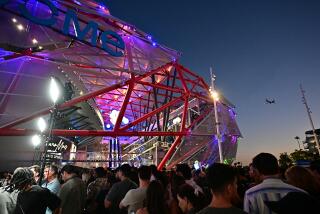Firms Frowning on ‘Happy Hour,’ Survey Indicates
- Share via
Business people take note: The two-martini lunch and the after-work “happy hour” may be on the wane, according to a survey on corporate alcohol use in Orange County.
In a sampling of the county’s 500 largest private employers by the Orange County Health Care Agency and the county Chamber of Commerce, more than a third of the firms responding said they discouraged drinking during a business lunch, 27% said they did not permit alcohol at any company event and another 36% discouraged participation in that once-popular American tradition: “happy hour.”
The survey revealed a new corporate concern about curbing alcohol abuse, said Susan G. Zepeda, deputy director of county alcoholism services.
Working with the Chamber of Commerce, Zepeda, a health planner and social psychologist with the Health Care Agency, surveyed 500 firms involved in manufacturing, transportation, banking and other sectors, and received responses from 285.
‘Corporate Culture’ Changing
The results surprised both Zepeda and Orange County Chamber of Commerce President Lucien Truhill.
Several years ago “probably a quarter of the firms would have said alcohol was an important component of the business environment,” Zepeda said, but today, the “corporate culture” has changed.
“Instead we were surprised at the number of employers who said (alcohol abuse) was a costly problem for them and they were taking steps to do something about it,” Zepeda said. “A quarter said alcohol use is a costly contributor to reduced productivity.”
She added: “I think we are seeing the start of a movement--a movement to recognize the role of an employer in shaping high-risk alcohol decisions . . . either by subtly or overtly discouraging alcohol use.”
No study of this kind had been done previously in Orange County, and little comparative data from other areas is available. Zepeda, who said her study is the first of its kind, said she will present the results next month at the American Public Health Assn. convention in New Orleans.
Said Truhill: “I had thought it was one of those hidden problems that people would want to sweep under the rug (but) it seems business in the county was more concerned about this problem than I had thought was the case. . . .”
Liability a Concern
“In moderate-size and larger industry there is a deep concern,” largely because of an employer’s potential liability in an accident at work or on the way home from work, Truhill said.
Among the survey’s findings:
- “Appearing inebriated at the work site” was not permitted by any firm--and was always grounds for discipline at 78% of the firms.
- 71% of the companies said they had formal policies restricting alcohol use. However, only 66% of those companies have specific policies prohibiting managers from drinking. Reported one firm, “Excessive alcohol use is usually found at managers’ level, especially sales.”
- 35% of the companies will not reimburse an employee for alcohol consumed at a business lunch.
- 27% of the companies will never allow alcoholic beverages at a corporate event such as an open house or reception, and 25% will not allow any alcoholic beverages at a company Christmas party. By contrast, 10% of the firms said they “always” serve alcoholic beverages at a company party, 33% said they “often” do and another 30% said they “rarely” do so.
- 65% have formal policies barring driving company vehicles after drinking alcohol.
- When companies do serve alcoholic beverages at corporate events, 79% also make sure non-alcoholic beverages are on hand.
Oddly, some companies appeared to be inconsistent in their application of alcohol policies, Zepeda noted. For instance, “it is possible an employee is being reimbursed for his drinks at lunch but is also being told that he can’t drive back in the company car,” she said.
Champagne Farewells
Zepeda attributed such inconsistencies to “the newness of the policies. There’s a policy that says you can’t drink in the office, but a longstanding tradition of champagne parties to say farewell to an employee. One policy hasn’t caught up with the other,” she said.
In the case of office Christmas parties, Zepeda reported that “a small number of respondents have discontinued the practice.” But when companies do have parties, some now try hard to make sure no one leaves intoxicated, she said. One firm offers free hotel rooms for the night and hires drivers to take employees home; at the same firm, the first two drinks are free, but revelers must pay for all additional drinks.
The survey was a first effort by the county Health Care Agency to examine public policy on alcohol use, Zepeda said.
For years, the county has operated clinics for alcohol abusers and offered information on alcohol abuse to community groups. “But this is the first time we’ve moved to the level of working with somebody (a corporation) whose actions shape the actions of many other people,” she said.
More to Read
Inside the business of entertainment
The Wide Shot brings you news, analysis and insights on everything from streaming wars to production — and what it all means for the future.
You may occasionally receive promotional content from the Los Angeles Times.










